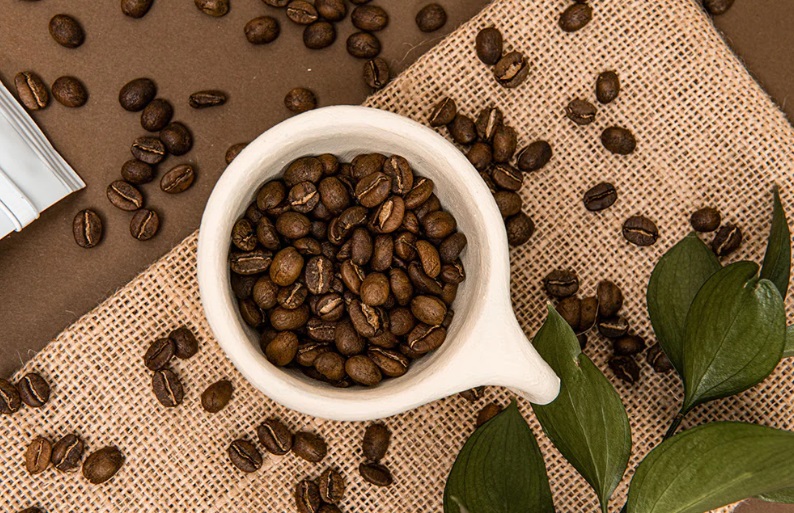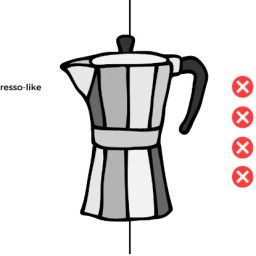
French Roast coffee is celebrated for its bold and robust flavor that emerges from a longer roasting process. This extended roasting time allows the beans to develop a deep, dark color, which is a hallmark of French Roast. The result is a coffee that offers a rich and intense taste experience.
The flavor of French Roast coffee can be described as smoky and bold, with a significant reduction in acidity compared to lighter roasts. It often features hints of dark chocolate and caramel, adding a touch of sweetness to the bold, burnt notes that are typical of this roast. These complex flavors make French Roast a favorite among those who enjoy a hearty, impactful cup of coffee.
Key Takeaways about Taste of French Roast Coffee
- Intense Flavors: French Roast coffee stands out with its dark, smoky flavor profile, characterized by reduced acidity and strong, burnt notes.
- Tasting Notes: You might detect the richness of burnt sugar or bitter chocolate, enriching the coffee’s boldness.
- Optimal Brewing: To fully appreciate the depth of French Roast, brewing methods like the French press or drip brewing are recommended. These methods help in extracting the full range of flavors from the beans.
- Health Benefits: Besides its unique taste, French Roast coffee is noted for its high antioxidant levels. These antioxidants can help protect the body against free radicals, contributing to overall health. Additionally, the robust flavor of French Roast can also lead to an improved mood for many coffee lovers.
Roasting Process and Its Impact on Flavor
The roasting process is crucial in shaping the character of French Roast coffee. During roasting, the beans are heated to high temperatures, which causes chemical reactions like the Maillard reaction and caramelization. These reactions develop the bean’s flavor, body, and reduce its acidity.
Flavor Development: As the beans are roasted past the second crack, they achieve the dark color and oily surface characteristic of French Roast. This stage intensifies the smoky flavor while reducing the natural acidity of the coffee beans, leading to a bolder cup with a fuller body.
Comparison with Other Dark Roasts: Compared to Italian and espresso roasts, French Roast is somewhat lighter, though still very dark. Italian roast beans are roasted even longer, making them darker and sometimes almost charred, which can introduce a bitter note. Espresso roast, commonly used for espresso due to its optimal flavor extraction under high pressure, is less smoky than French Roast and often has a sharper profile.
Brewing the Perfect Cup of French Roast
Brewing French Roast coffee correctly is key to enjoying its full potential. The goal is to complement its deep flavors without overshadowing its unique characteristics.
Brewing Methods
- French Press: This method is ideal for French Roast due to its immersion brewing technique, which allows the coffee to steep directly in boiling water, extracting rich flavors and oils without filtering out sediments.
- Cold Brew: Cold brewing French Roast can soften its intense profile, making it smoother and less acidic. This method involves steeping coffee grounds in cold water for several hours.
- Pour-over: Using a pour-over can control the brewing time and temperature, which is crucial for balancing the smoky and bold flavors of French Roast without extracting too much bitterness.
Health Benefits and Caffeine Content of French Roast Coffee
French Roast coffee, like other dark roasts, is notable for its health benefits, primarily due to its rich antioxidant content. These antioxidants, including polyphenols and hydrocinnamic acids, play a role in neutralizing harmful free radicals in the body. This action helps reduce oxidative stress, which is linked to various chronic diseases.
Antioxidant Power
The roasting process that defines French Roast coffee actually increases its antioxidant levels compared to lighter roasts. These compounds are essential for protecting the body against cell damage and inflammation. Regular consumption of antioxidant-rich coffee can contribute to heart health and may lower the risk of infections.
Mood and Energy
Beyond antioxidants, French Roast coffee is also a source of caffeine, known for its ability to boost energy and improve focus. For many, the ritual of drinking a bold cup of French Roast can enhance alertness and lead to better cognitive function throughout the day. Additionally, the act of taking a coffee break can offer a mental lift, aiding in stress reduction and overall well-being.
Caffeine Content
When it comes to caffeine, the content in French Roast might be slightly lower than in lighter roasts. This is due to the extended roasting times at high temperatures, which can degrade some of the caffeine molecules.
Comparison with Lighter Roasts
Although the difference is not dramatically significant, it’s generally understood that a cup of French Roast coffee may have slightly less caffeine than its lighter roasted counterparts. For instance, while a typical 8-ounce cup of coffee might average about 95 mg of caffeine, French Roast could be somewhat lower. This makes it a suitable choice for those who are sensitive to caffeine but still enjoy a robust cup of coffee.
Personal Tolerance
It’s important to consider your own caffeine tolerance when choosing your coffee roast. If you’re looking for a morning wake-up call or an afternoon pick-me-up, French Roast offers enough caffeine to be effective, but with potentially less impact than lighter roasts, which retain more caffeine due to shorter roasting times.
FAQs
What is the difference between French Roast and Turkish coffee?
French Roast refers to a dark roast level of coffee beans characterized by their dark color, smoky flavor, and oily surface. It’s popular in Western coffee culture and is brewed using methods like drip, French press, or espresso. In contrast, Turkish coffee is not a roast type but a brewing method from Turkey that uses very finely ground coffee beans simmered in a pot, typically with sugar, and served with the grounds settling in the cup.
Is French Roast stronger than dark roast?
French Roast is one of the darkest roasts available, darker than most traditional dark roasts. This means it generally has a stronger, smokier flavor profile, but not necessarily more caffeine. In fact, darker roasts like French Roast often have slightly less caffeine than lighter roasts due to the extended roasting process.
What are the health implications of drinking French Roast coffee?
French Roast coffee shares similar health benefits with other types of coffee, including being a significant source of antioxidants. These compounds can help protect your cells against damage. However, due to its robust flavor and potential acidity, it may not be suitable for everyone, especially those with sensitive stomachs or acid reflux. As with any coffee, moderation is key.
Final Thoughts
French Roast coffee offers a unique experience for coffee lovers who appreciate a robust, smoky flavor. This type of coffee undergoes an extended roasting process, which not only deepens its flavor but also slightly reduces its caffeine content compared to lighter roasts. Ideal for those who enjoy a bold taste without the higher caffeine kick.
For those new to French Roast, starting with a brewing method that allows for flavor adjustment, such as a French press or pour-over, can be beneficial. These methods let you control the strength and richness of the brew. If you’re exploring French Roast for the first time, consider pairing it with a bit of milk or sugar to balance its strong profile.









